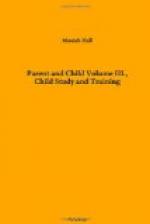Immediately after birth certain reflexive and instinctive movements, such as sucking, crying, sneezing and clinging are manifested; and the sense of taste and usually smell are also sufficiently active to enable the infant to take nourishment. No other senses are active and no other movements possible except the automatic action of vital organs and a few vague spasmodic twitchings and movements of parts of the body known as impulsive. Nothing, however, can be done from without to hasten the mental awakening; Nature in her own due time will do this, and do it much better if not hurried or interfered with.
LESSON V
QUESTIONS FOR DISCUSSION
1. Show that the infant is not an adult in miniature.
2. What are some important differences between the child and the adult?
3. What is the supreme need of the infant? Why?
4. What should be observed in caring for the child?
5. What should be avoided in caring for the child?
6. What should be the rule in early mental development?
7. What is active in the child immediately after birth?
“The Care of the Child in Health,” by Oppenheim, will be helpful here. If the book is in the parents’ library, let someone prepare and make a brief report on it for next lesson.
The following other helps may be had for the asking by writing to the U.S. Bureau of Education: “Parental Care,” by Mrs. West, Series No. 1, publication No. 4, U.S. Department of Labor, Children’s Bureau. The following chapter is taken from one of these bulletins prepared for parents by our Government.
CARE OF THE BABY IN SUMMER
Summer Is a Critical Time for the Infant, During This Time It Should Receive the Most Careful Attention
A baby must be kept as cool as possible in summer, because over-heating is a direct cause of summer diarrhea. Even breast-fed babies find it hard to resist the weakening effects of excessive heat. Records show that thousands of babies, most of whom are bottle-fed, die every year in July and August, because of the direct or indirect effects of the heat. Next in importance to right food in summer are measures for keeping the baby cool and comfortable; frequent baths, light clothing and the selection of the coolest available places for him to play and sleep.
A baby should have a full tub bath every morning. If he is restless and the weather is very hot, he may have in addition one or two sponge baths a day. A cool bath at bedtime sometimes makes the baby sleep more comfortably. For a young baby, the water should be tepid; that is, it should feel neither hot nor cold to the mother’s elbow. For an older baby it may be slightly cooler, but should not be cold enough to chill or frighten him.
If the water is very hard a tablespoonful of borax dissolved in a little water may be added to three quarts of water to soften it. Very little soap should be used and that a very bland, simple soap, like castile. Never rub the soap directly on the baby’s skin, and be sure that it is thoroughly rinsed off, as a very troublesome skin disease may result if a harsh soap is allowed to dry on the skin.




